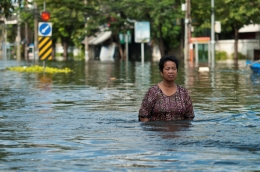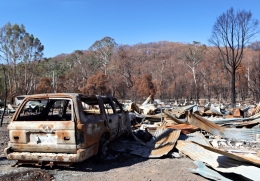06 March 2014
 According to the Intergovernmental Panel on Climate Change as the planet warms we can expect an intensification of weather conditions – more lethal hurricanes; longer droughts with higher temperatures and greater risk of intensified fires; and wetter monsoons with consequent flooding on a much wider scale.
According to the Intergovernmental Panel on Climate Change as the planet warms we can expect an intensification of weather conditions – more lethal hurricanes; longer droughts with higher temperatures and greater risk of intensified fires; and wetter monsoons with consequent flooding on a much wider scale.
And that’s only part of the picture – earthquake, tsunami, bioterrorism, pandemics, famine and war all have the potential to unseat order, threaten lives and lifestyles, compromise cultures and societies.
How we cope with this intensification of both the breadth and depth of disasters will be at the centre of a major conference at the University of South Australia in March presented by UniSA’s Hawke Research Institute.
The conference – States of Emergency – will address the economic, cultural, political and psychological impacts of recent global and regional disasters.
Sponsored by the Japan Foundation, and in association with Chiba University and Keio University, the event aims to promote a much needed dialogue between leading Japanese and Australian social scientists on global disasters in the Asia Pacific region.
Director of UniSA’s Hawke Research Institute Professor Anthony Elliott says the expertise Japanese academics bring to the conference is invaluable.
“Against the backdrop of the Great East Earthquake of 2011 and the trauma of Fukushima, Australia has much to learn from recent Japanese experience – especially in terms of approaches to community resilience and the support of victims,” Prof Elliott says.
 “The emerging challenges are huge, almost beyond our comprehension.
“The emerging challenges are huge, almost beyond our comprehension.
“It has been estimated that the chances of humanity surviving the 21st century are only 50/50.
“And that isn’t inexpert doomsday alarmism - the claim comes from Sir Martin Rees, former president of the UK’s Royal Society.
“Part of playing those odds in humanity’s favour will be about understanding the impacts of disasters, being equipped to meet the political, psychosocial and organisational challenges they throw up and developing resilience and innovation in communities.”
Prof Elliott says dealing with new threats of destruction in the biological, environmental and nuclear spheres are issues at the core of the conference program.
“The conference will also look carefully at new challenges raised by global warming and climate change, factoring in the wide range of predictions about the impacts on weather, disease and food production,” Prof Elliott says.
States of Emergency will run from March 18-20 2014.
Media contact: Michèle Nardelli office: 08 8302 0966 mobile: 0418 823 673 email: Michele.nardelli@unisa.edu.au



